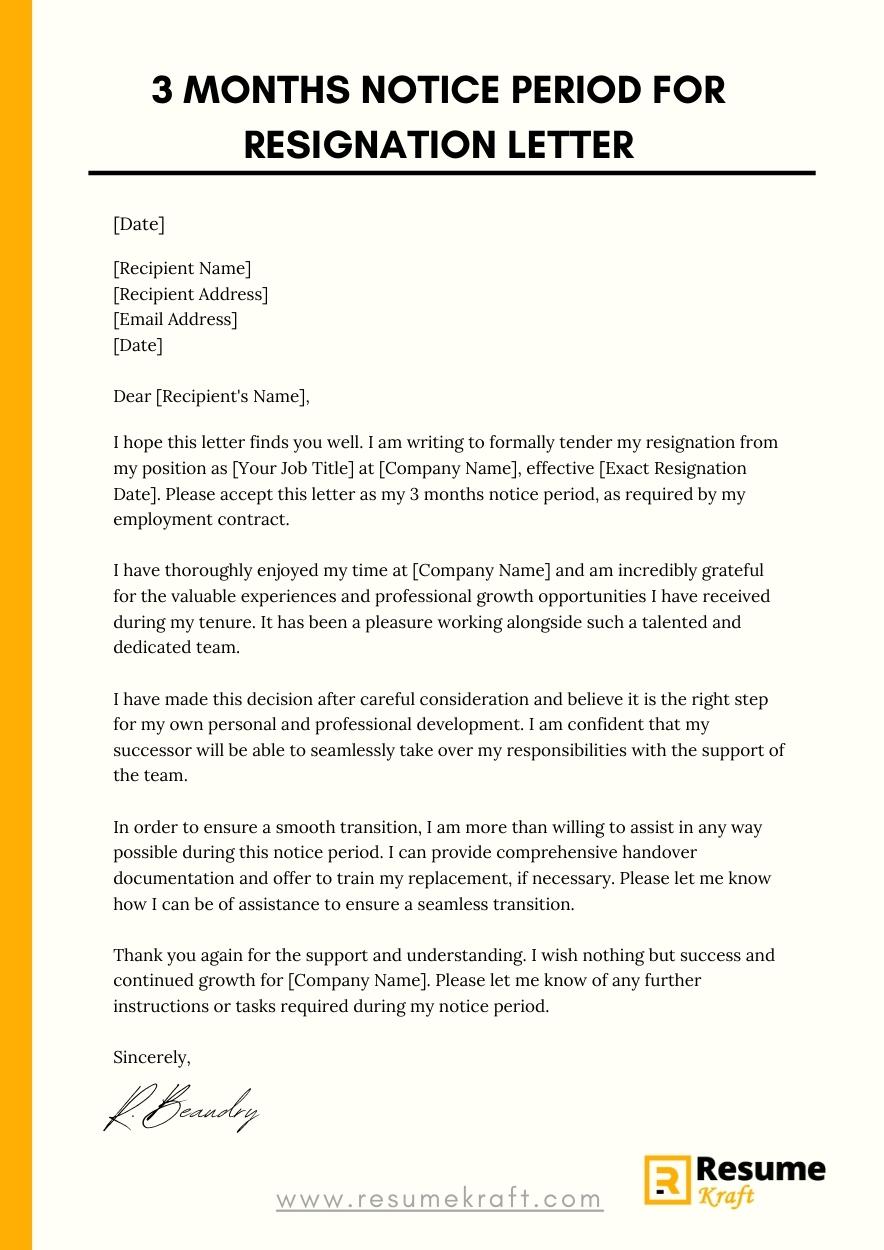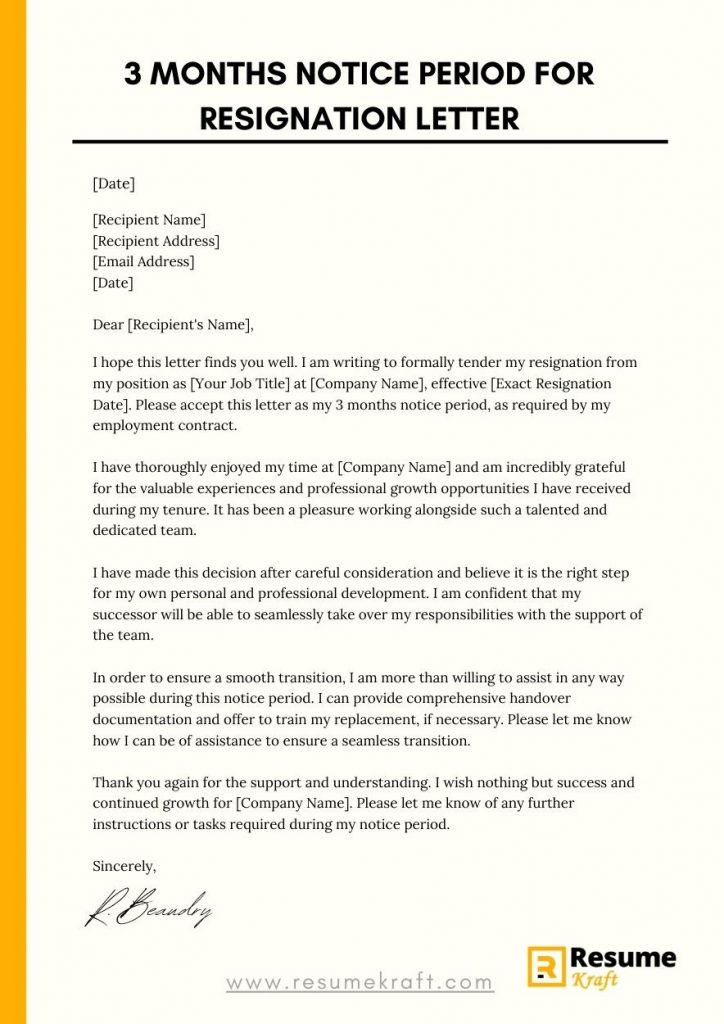
Are you planning to leave your current job, but your employment contract requires you to provide a 3 months notice period? Writing a resignation letter with such a long notice can be challenging, as you want to maintain professionalism while ensuring a smooth transition for your employer. In this guide, we will walk you through the process of writing a resignation letter with a 3 months notice period. We will cover what to include, what to avoid, how to format your letter, and provide you with real person resignation letter samples to inspire your own. Let’s jump in!
Leaving a job can be a significant and potentially stressful decision. It is crucial to handle your resignation in a professional manner, which includes providing ample notice to your employer. A resignation letter serves as both a formal notification and a documentation of your intention to leave the company. Writing a well-crafted resignation letter not only helps you leave on a positive note but also maintains your professional reputation. So, let’s dive into the essential components to include in your resignation letter with a 3 months notice period.
What To Include in a Resignation Letter with a 3 Months Notice Period
When writing a resignation letter with a 3 months notice period, it’s important to include the following elements:
- Header and Date: Begin your resignation letter with your contact information, including your name, address, phone number, and email. Below that, add the date of the letter.
- Recipient’s Information: Address your resignation letter to your immediate supervisor or the relevant HR representative. Include their name, job title, and company address.
- Greeting: Start your letter with a respectful salutation, such as “Dear [Supervisor’s Name],”.
- Statement of Intent: Clearly state your intention to resign in the opening paragraph. For example, “I am writing to formally tender my resignation from my position as [Your Job Title] at [Company Name].”
- Notice Period: Specify your desired notice period, which should be 3 months. This allows your employer enough time to find a suitable replacement and transition your responsibilities.
- Reason for Resignation: While not mandatory, you can briefly mention your reason for leaving. Be diplomatic and focus on positive aspects, such as career growth or personal development.
- Expressions of Gratitude: Express gratitude for the opportunities and experiences gained during your employment. This helps maintain a positive relationship with your employer and colleagues.
- Offer Assistance: Show your willingness to assist in the transition process by offering to train your replacement or provide any necessary handover documentation.
- Closing: End your resignation letter with a professional closing, such as “Sincerely” or “Best regards,” followed by your full name and signature.
Now that you know what to include in your resignation letter, let’s discuss what you should avoid to maintain professionalism and avoid any potential misunderstandings.
What Not to Include in Your Resignation Letter
When writing your resignation letter with a 3 months notice period, it’s important to avoid including certain elements that may be inappropriate or counterproductive. Here are a few things you should not include:
- Negative Remarks: Avoid criticizing the company, your colleagues, or any negative experiences in your resignation letter. Maintain a positive and professional tone throughout.
- Emotional Language: While it is natural to have mixed feelings when resigning, refrain from expressing strong emotions in your letter. Keep it professional and focus on your decision to move forward in your career.
- Detailed Reasons: It is not necessary to go into extensive detail about your reasons for leaving. Keep the explanation brief and diplomatic.
- Bridges Burning: Do not use your resignation letter as a platform to air grievances or settle scores. Maintain a respectful and professional tone, as this document may be kept on record.
- Counteroffers: If you have received a counteroffer from your employer, it is best not to mention it in your resignation letter. Counteroffers can be discussed separately during the resignation process.
By avoiding these pitfalls, you can ensure that your resignation letter reflects professionalism and leaves a positive impression. Now, let’s move on to the formatting guidelines for your resignation letter.
How To Format a Resignation Letter with a 3 Months Notice Period
To maintain a professional appearance and readability, follow these formatting guidelines for your resignation letter:
- Font and Size: Use a readable font, such as Arial or Times New Roman, in size 12. This ensures your letter is easy to read and presents a professional image.
- Margins and Alignment: Set your page margins to one inch on all sides. Align your text to the left for a clean and organized look.
- Paragraphs and Spacing: Divide your resignation letter into paragraphs for clarity and readability. Leave a single blank line between each paragraph.
- Length: Keep your resignation letter concise and to the point. Aim for one page, if possible, unless you have additional relevant information to include.
- Proofreading: Before submitting your resignation letter, proofread it thoroughly to avoid any grammatical or spelling errors. You may consider using editing and proofreading tools or seeking a second opinion from a trusted colleague.
By following these formatting guidelines, you can create a polished and professional resignation letter. To further assist you, we have provided real person resignation letter samples for different scenarios to guide your writing process.
Real Person Resignation Letter Samples

Printed Resignation Letter Sample
[Your Name]
[Your Address]
[City, State, ZIP]
[Phone Number]
[Email Address]
[Date]
[Recipient’s Name]
[Recipient’s Job Title]
[Company Name]
[Company Address]
Dear [Recipient’s Name],
I hope this letter finds you well. I am writing to formally tender my resignation from my position as [Your Job Title] at [Company Name], effective [Exact Resignation Date]. Please accept this letter as my 3 months notice period, as required by my employment contract.
I have thoroughly enjoyed my time at [Company Name] and am incredibly grateful for the valuable experiences and professional growth opportunities I have received during my tenure. It has been a pleasure working alongside such a talented and dedicated team.
I have made this decision after careful consideration and believe it is the right step for my own personal and professional development. I am confident that my successor will be able to seamlessly take over my responsibilities with the support of the team.
In order to ensure a smooth transition, I am more than willing to assist in any way possible during this notice period. I can provide comprehensive handover documentation and offer to train my replacement, if necessary. Please let me know how I can be of assistance to ensure a seamless transition.
I would like to express my sincerest gratitude to all my colleagues, supervisors, and mentors for their support and guidance throughout my time at [Company Name]. I truly appreciate the opportunities I have been given to learn and grow both personally and professionally.
Thank you again for the support and understanding. I wish nothing but success and continued growth for [Company Name]. Please let me know of any further instructions or tasks required during my notice period.
Sincerely,
[Your Full Name]
[Your Signature]
Email Resignation Letter Example
Subject: Formal Resignation – [Your Name]
Dear [Recipient’s Name],
I hope this email finds you well. I am writing to inform you of my resignation from my position as [Your Job Title] at [Company Name]. Please consider this email as my formal notification and 3 months notice period, as stated in my employment contract.
My last working day with [Company Name] will be on [Exact Resignation Date]. It has been an incredible journey working with the dedicated individuals at [Company Name], and I am grateful for the opportunities I have had for growth and development.
I have thoughtfully made this decision in pursuit of new challenges and personal growth. I am confident that the team will be able to successfully continue the great work we have accomplished together.
During my remaining time at [Company Name], I am committed to ensuring a smooth transition. I am available to provide any necessary handover documentation or assist in training a successor. Please let me know how I can best support the team during this period.
I would like to express my sincere appreciation to everyone at [Company Name] for their support, guidance, and camaraderie throughout my tenure. I have truly valued the relationships built and the invaluable learning experiences gained.
Once again, thank you for your understanding and support. I look forward to completing my remaining tasks and contributing to a successful transition. Please feel free to reach out to me if you need any further information or have any specific instructions.
Best regards,
[Your Full Name]
[Your Contact Number]
[Your Email Address]
Key Takeaways
Writing a resignation letter with a 3 months notice period requires careful thought and attention. Key takeaways from this guide include:
- Be professional and respectful throughout the letter.
- Clearly state your intention to resign and provide the specific 3 months notice period.
- Express gratitude for the opportunities and experiences gained during your employment.
- Offer assistance in the transition process, such as providing handover documentation or training your replacement.
- Avoid negative remarks, emotional language, and burning bridges in your resignation letter.
By following these guidelines and using the provided resignation letter samples, you can effectively communicate your intentions, leave on good terms, and maintain your professional reputation.
Frequently Asked Questions (FAQs)
Q: What is the purpose of a resignation letter?
A: A resignation letter serves as a formal notification to your employer that you intend to leave your position. It documents the date of your resignation, specifies the notice period you will provide, and expresses gratitude for the opportunities you have had. It is also an opportunity to offer assistance in the transition process and maintain a positive relationship with your employer.
Q: Is it necessary to state the reason for resignation in the letter?
A: It is not mandatory to state the reason for resignation in your letter, especially if it is a personal or sensitive matter. However, if you feel comfortable and the reason is positive, you can briefly mention it. Focus on your career growth or personal development rather than any negative aspects.
Q: Should I mention a counteroffer from my employer in the resignation letter?
A: It is generally best not to mention a counteroffer in your resignation letter. Counteroffers can be discussed separately during the resignation process if you choose to consider them. It is important to keep your resignation letter focused on your intention to leave and to maintain a professional tone.
Q: How should I deliver my resignation letter?
A: The method of delivering your resignation letter depends on your company’s policies and preferences. You can hand-deliver it to your supervisor or HR representative, or you can send it via email if that is the preferred method of communication in your organization. Make sure to keep a copy of the letter for your records.
Q: Should I have a conversation with my supervisor before submitting the resignation letter?
A: It is generally a good idea to have a conversation with your supervisor before submitting your resignation letter. This allows you to explain your decision in person, answer any questions they may have, and discuss the next steps in the process. The resignation letter should serve as a formal follow-up to the conversation.
Conclusion
Crafting a resignation letter with a 3 months notice period requires careful consideration and attention to detail. By following the guidelines provided in this comprehensive guide, you can ensure that your resignation letter is professional, respectful, and effective. Remember to include the necessary elements, avoid negative remarks, and offer assistance during the transition period. Use the real person resignation letter samples as inspiration to create your own personalized letter. A well-written resignation letter will not only help you leave your current job on good terms but also maintain your professional reputation as you embark on new opportunities.

